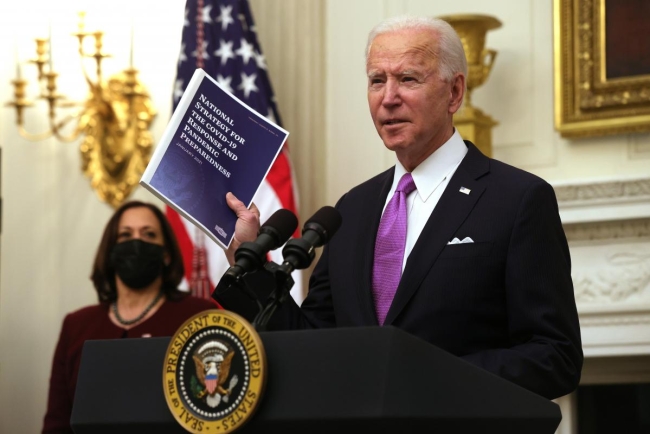You have /5 articles left.
Sign up for a free account or log in.

President Biden spoke Thursday about a new strategy for combating COVID-19.
Alex Wong/Getty Images News/Getty Images
President Biden signed an executive order Thursday directing the secretary of education to provide, in consultation with the secretary of health and human services, “evidence-based guidance to institutions of higher education on safely reopening for in-person learning, which shall take into account considerations such as the institution’s setting, resources, and the population it serves.”
The “Executive Order on Supporting the Reopening and Continuing Operation of Schools and Early Childhood Education Providers” was one of 10 orders signed by Biden in conjunction with the release of a new 200-page strategy from the White House on COVID-19 response.
The strategy includes a goal of administering 100 million vaccines in Biden's first 100 days in office and a plan to invoke the Defense Production Act to address supply gaps in production of vaccines, tests, personal protective equipment and other needed supplies. The strategy calls for expanding testing and face mask wearing, including through new masking requirements for interstate travel.
In remarks Thursday, Biden described the plan as a “wartime undertaking.”
One of the seven goals listed in the strategy is to support schools, colleges and businesses in safely reopening while supporting workers. The document calls for more guidance to colleges to that end.
“Given the diversity of settings in which colleges operate and the diversity of services they offer, postsecondary institutions need detailed guidance on recommended COVID-19 protocols that covers a variety of scenarios,” the strategy document states. “The Department of Education, in consultation with the [Centers for Disease Control and Prevention], will conduct outreach to postsecondary institutions and review existing guidance to provide updates that give colleges and universities the latest, science-backed and data-driven recommendations on how and when to open.”
The CDC has issued guidance for colleges. But some experts have argued the existing advice is lacking in specificity in some areas and leaves too much discretion to individual institutions and states, resulting in a wide variety of approaches across colleges.
“We as a country need far more guidance than we have to date,” said Leana Wen, an emergency physician and visiting professor of health policy and management at the George Washington University School of Public Health. She hopes the new guidance for higher ed "contains different levels of virus spread, and what kinds of measures must be done at each level. You can imagine if there is fairly low community spread, maybe the following 20 criteria need to be met for safe reopening, but at a higher level you don’t just need 20, you need 20 more. And maybe there’s a certain level where it’s not safe for a university to reopen. I think such guidance that is evidence-based and that is benchmarked against data will be really important to help guide universities that are struggling with many difficult choices right now.
“The point is not to stifle innovation,” Wen added, “but rather it’s to say that there must be a baseline that determines safety, and each institution should not have to reinvent the wheel. At this point there are best practices that can be learned from institutions that have already been successful in containing COVID-19. Can we share these best practices and formulate recommendations based on the experiences that already exist?”
The executive order signed by Biden Thursday directs the Education Department to develop a Safer Schools and Campuses Best Practices Clearinghouse to share information on reopening safely.
It also directs the Department’s Office for Civil Rights “to deliver a report as soon as practicable on the disparate impacts of COVID-19 on students in elementary, secondary, and higher education, including those attending historically black colleges and universities, Tribal colleges and universities, Hispanic-serving institutions, and other minority-serving institutions.”
“College enrollment for high school graduates was down more than 20 percent in 2020 compared to 2019, and students from low-income families are nearly twice as likely to report canceling their plans to attend college,” the strategy document states. “Reopening and keeping colleges open is critical to ensuring that all Americans have a shot at a college credential -- but it must be done safely, to protect the health of students, faculty, staff, and the broader community.”
The White House strategy reiterates Biden’s call for $35 billion in additional stimulus funds for colleges to help them weather the pandemic. The strategy describes a need to help underresourced institutions build up their testing capacity and says the federal government will work with states to “ensure that under-resourced colleges -- including community colleges, historically black colleges and universities (HBCUs), Tribal Colleges and minority serving institutions -- have access to COVID-19 tests to support reopening.”
Gerri Taylor, the co-chair of the American College Health Association's COVID-19 task force, said she's been pleased with the guidance the CDC has already issued to colleges, and pointed out that her organization has issued many resources for colleges as well. But she said colleges badly need more resources for testing, and down the road, for administration of vaccines.
"We've recommended in our guidance to test if possible on arrival, when the students return for spring semester and then test twice a week thereafter," she said. "That requires money, staffing, PPE."
Taylor said she was heartened to see Biden make the issue of safely reopening schools a top priority on his first full day in office. “It shows that the federal government recognizes the importance of making our K-12 and colleges safe learning environments, where our ultimate goal is having students be able to stay healthy and learn and graduate.”
"I think it gives us all a feeling of being heard," Taylor said of Biden's attention to the issue, "and we very much appreciate it."








